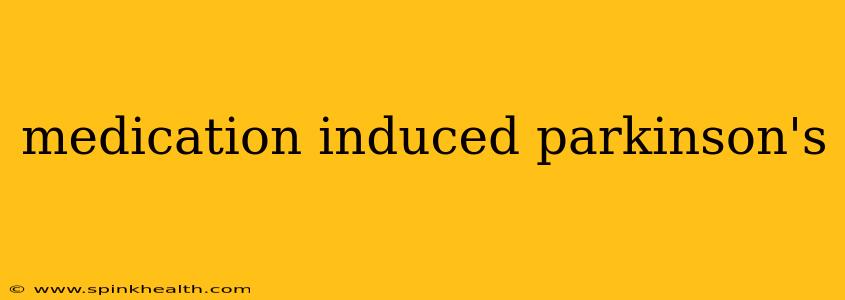Parkinson's disease, a progressive neurological disorder, is often associated with tremors, rigidity, and slow movement. However, a similar constellation of symptoms can arise as a side effect of certain medications, a condition known as medication-induced parkinsonism (MIP). Understanding MIP is crucial because it's often treatable, unlike Parkinson's disease itself. This article will delve into the intricacies of MIP, exploring its causes, symptoms, diagnosis, and treatment. Think of this as your comprehensive guide to navigating this often-misunderstood condition.
What Causes Medication-Induced Parkinsonism?
The story of MIP begins with dopamine, a neurotransmitter crucial for smooth muscle movement. Many medications, particularly those blocking or depleting dopamine, can disrupt this delicate balance, leading to parkinsonian symptoms. It's not a direct attack on the brain's dopamine-producing cells like in Parkinson's disease; rather, it's a disruption of the system's normal functioning.
The most common culprits include:
- Antipsychotic medications: These drugs, often used to treat schizophrenia and bipolar disorder, are notorious for causing MIP. They work by blocking dopamine receptors in the brain.
- Metoclopramide: This antiemetic (anti-vomiting) drug, commonly used to treat nausea and vomiting, can also interfere with dopamine pathways.
- Neuroleptic malignant syndrome (NMS) medications: While less frequent, medications used to treat NMS (a severe, potentially life-threatening neurological disorder) can also induce parkinsonism.
- Other medications: Several other medications, such as some antidepressants and antihypertensives, can contribute to or worsen existing parkinsonian symptoms.
It's important to remember that not everyone taking these medications will develop MIP. Individual sensitivity, dosage, and duration of treatment play significant roles in determining the risk.
What are the Symptoms of Medication-Induced Parkinsonism?
The symptoms of MIP closely mimic those of Parkinson's disease, making accurate diagnosis crucial. These symptoms can range in severity and may include:
- Bradykinesia: Slowness of movement. This is often one of the first noticeable symptoms.
- Rigidity: Stiffness and resistance to passive movement in the limbs and trunk.
- Tremor: Involuntary shaking, typically at rest. This is less prominent in MIP than in Parkinson's.
- Postural instability: Difficulty maintaining balance and an increased risk of falls.
- Masked facies: A blank, expressionless facial appearance.
- Gait changes: Shuffling gait, small steps, and difficulty initiating movement.
How is Medication-Induced Parkinsonism Diagnosed?
Diagnosing MIP involves a careful evaluation of symptoms, medical history, and a thorough review of the patient's medication list. The physician will look for a temporal relationship between the onset of symptoms and the start of a new medication or a change in dosage. Other neurological conditions will be ruled out through detailed neurological examination. There is no single definitive test for MIP; diagnosis is primarily clinical.
How is Medication-Induced Parkinsonism Treated?
The cornerstone of MIP treatment is identifying and, if possible, discontinuing or reducing the offending medication. This may not always be feasible, especially in cases where the medication is crucial for treating a serious underlying condition. In such instances, the physician may consider:
- Amantadine: This medication can help alleviate some symptoms of MIP.
- Benztropine: This anticholinergic drug can improve rigidity and tremor.
- Dopamine agonists: These medications can enhance dopamine levels in the brain, although their use in MIP is sometimes debated due to potential side effects.
Can Medication-Induced Parkinsonism be Prevented?
While there's no foolproof way to prevent MIP, careful medication management is essential. This includes:
- Careful medication review: Regularly assessing the necessity of all medications.
- Lowest effective dose: Prescribing the lowest effective dose of medications known to cause MIP.
- Monitoring for symptoms: Regularly monitoring patients for any signs of parkinsonian symptoms.
- Switching medication if possible: Exploring alternative medications that do not carry the same risk.
What is the prognosis for Medication-Induced Parkinsonism?
The prognosis for MIP is generally good, provided the underlying cause is identified and addressed appropriately. Symptoms often improve significantly or even resolve completely once the offending medication is discontinued or the dose is reduced. However, in some cases, symptoms may persist even after medication adjustments. Regular monitoring and close collaboration with a healthcare provider are vital for optimal management.
Is Medication-Induced Parkinsonism Reversible?
Yes, in many cases, MIP is reversible once the causative medication is discontinued or its dosage is reduced. The speed of recovery varies depending on the individual and the severity of symptoms. Some patients experience complete symptom resolution, while others may experience residual effects.
What's the difference between Medication-Induced Parkinsonism and Parkinson's Disease?
While they share similar symptoms, MIP and Parkinson's disease are distinct conditions. MIP is caused by a medication's effect on dopamine pathways, while Parkinson's disease results from the degeneration of dopamine-producing neurons in the brain. MIP is typically reversible upon medication adjustment, whereas Parkinson's disease is a progressive, incurable condition.
This detailed exploration hopefully clarifies the complexities of medication-induced parkinsonism. Remember, this information is for educational purposes only and should not substitute professional medical advice. Always consult with a healthcare professional for diagnosis and treatment.

